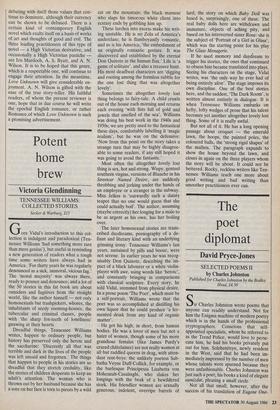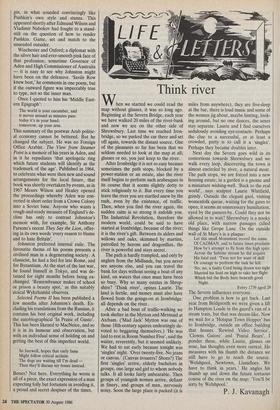The poet diplomat
David Pryce-Jones
SELECTED POEMS II by Charles Johnston
Published for Charles Johnston by the Bodley Head, £4.50
Sit Charles Johnston wrote poems that anyone can readily understand. Not for him the Enigma machine of modern poetry which is in the hands of the professional cryptographers. Conscious that self- appointed specialists, whom he referred to as the Trend Police, would love to perse- cute him, he had his books privately put out for him. Solzhenitsyn, newly resident in the West, said that he had been im- mediately impressed by the number of men whose talents were spurned because they were unfashionable. Charles Johnston was just such a poet; his books a kind of elegant samizdat, pleasing a small circle.
Not all that small, however, after the success of his translation of Eugene One- gin, in what sounded convincingly like Pushkin's own style and stanza. This appeared shortly after Edmund Wilson and Vladimir Nabokov had fought to a stand- still on the question of how to render Pushkin. Game, set and match to the unseeded outsider.
Winchester and Oxford; a diplomat with the silver hair and ever-smooth pink face of that profession; sometime Governor of Aden and High Commissioner of Australia — it is easy to see why Johnston might have been on the defensive. ‘Savile Row knew best,' he comments in one poem, but if the outward figure was impeccably true to type, not so the inner man.
Once I quoted to him his 'Middle East- ern Epigraph':
The world is your cucumber, and it moves around as minutes pass: today it's in your hand: tomorrow, up your arse.
This summary of the postwar Arab politic- al economy cannot be bettered. But he changed the subject. He was no Foreign Office Arabist. The View from Steamer Point is a memoir of his years in Aden, and in it he repudiates 'that apologetic ring which future students will identify as the trademark of the age'. Published in 1964, to celebrate what were then new and sound arrangements for the local future, that book was shortly overtaken by events, as in 1967 Messrs Wilson and Healey opened the proceedings whereby Aden was con- verted in short order from a Crown Colony into a Soviet base. Anyone who wants a rough-and-ready measure of England's de- cline has only to contrast Johnston's memoir with, for example, Sir Anthony Parsons's recent They Say the Lion, offer- ing in its own words 'every reason to blame and to hate Britain'.
Johnston preferred internal exile. The favourite theme of his poems presents a civilised man in a degenerating society. A classicist, he had a feel for late Rome, and for Byzantium. At the start of the last war, he found himself in Tokyo, and was de- tained for eight months before being ex- changed. 'Remembrance makes of school or prison a beauty spot,' as this suitably stoical Wykehamist observes.
Selected Poems II has been published a few months after Johnston's death. Ex- cluding his translations from the Russian, it contains his best original work, including the autobiographical 'In Praise of Gusto'. This has been likened to MacNeice, and so it is in its humour and observation, but with an individual sense of holding on and getting the best of this imperfect world.
So farewell, hopes that early fame Might follow critical acclaim.
The dogs are waiting till I'm dead - Then they'll discuss my bones instead.
Bones? Not here. Everything he wrote is all of a piece, the exact expression of a man expecting folly but fortunate in avoiding it, a proud and secret despiser of the times.









































 Previous page
Previous page